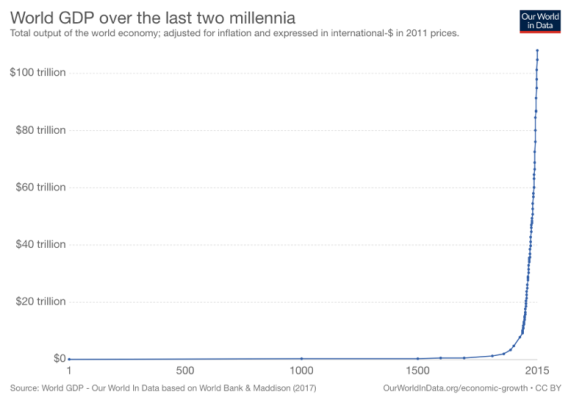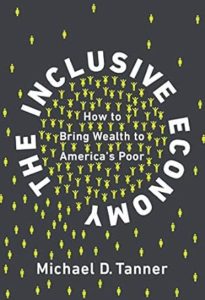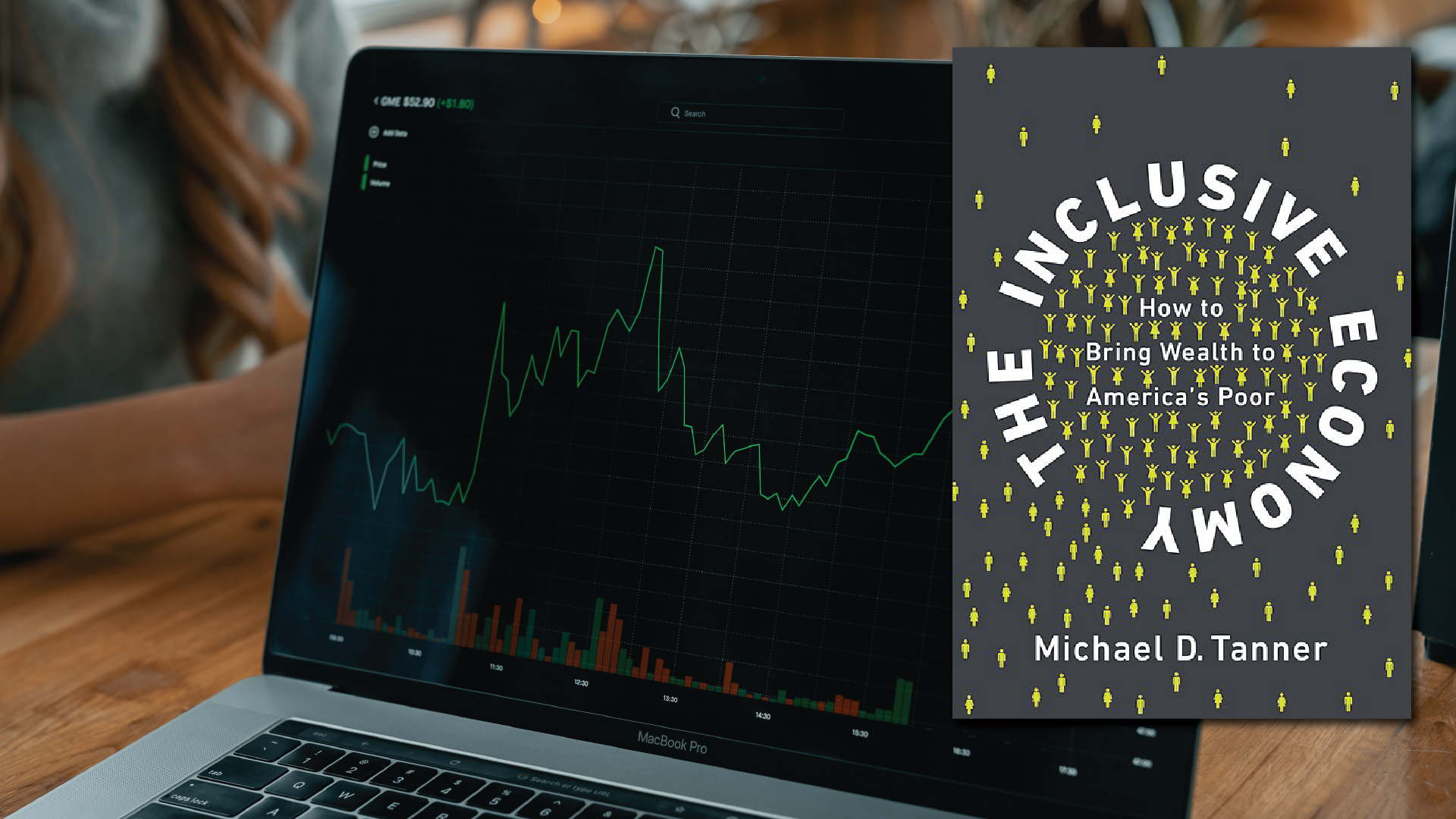Removing Barriers to The American Dream: A Synopsis of The Inclusive Economy

Savannah Aleckson
Events Director/Adjunct Instructor
Read more from Savannah
Jump to:
The Perspective | The Purpose of the Book | The Key Points | Details We Love | Considerations | Who Should Read This?
At the time of writing of The Inclusive Economy, author Michael Tanner had spent over 30 years studying poverty and welfare. Though he spent much of his career pointing out the flaws in the welfare state, in this book, he embarks on a more solution-oriented journey. While clearly writing from an academic perspective (the 85 pages of cited research at the end of his book demonstrate this tangibly), Tanner maintains an admirable view throughout: that behind all the research, dry statistics, and political quibbles about best approaches to poverty resolution are the lives of real people. Therefore, compassion and genuine concern for the welfare of the poor ought to temper all conversations about the nature of and best solutions to poverty.
The Inclusive Economy challenges narratives about poverty from both the political Left and Right. To those who would advocate for increased redistribution to ameliorate the effects of material poverty in the United States, Tanner cites the diminishing returns of the War on Poverty, President Johnson’s social welfare program that has rapidly expanded over the last several decades with little evidence that it’s helped the poor become self-sufficient. To those who would categorize poverty as being merely the natural outcome of bad life choices and insufficient planning, Tanner names specific systemic hurdles that disproportionately—and sometimes even intentionally—affect the poor and other disadvantaged groups negatively. Tanner provides five specific policy-level changes that he asserts would help level the playing field for the poor in America by creating greater access to opportunity and wealth-creating tools.
The book centers around five specific policy changes that Tanner contends would remove barriers to achieving “The American Dream” for the poor. Tanner doesn’t rely on the typical notion of “The American Dream,” one that focuses almost exclusively on material wealth. Instead, he reminds his readers of the origin of the phrase: James Truslow Adams wrote in his book The Epic of America that the American Dream “is not a dream of motorcars and high wages merely, but a dream of a social order in which each man and each woman shall be able to attain the fullest stature for which they are innately capable, and be recognized for what they are, regardless of the fortuitous circumstances of birth or position.” (For an additional perspective on the insufficiency of a materially-focused “American Dream” as an aim for those in need, see our article about the book Becoming Whole.)
With this conception of the American Dream framed as holistic human flourishing, Tanner makes the following suggestions:
1. Reform the criminal justice system and curtail the War on Drugs.
Tanner makes the argument that the criminal justice system in the US is fundamentally marred, resulting in mass incarceration that has grave repercussions, particularly for the poor. Leaving arguments about whether mass incarceration is a good use of resources or even whether it helps reduce crime rates, Tanner instead zeroes in on the specific effect of over-incarceration on people in poverty. His contention is two-fold:
-
- The United States over-criminalizes (an example Tanner uses in his book is arrests made over people selling single cigarettes without a tax stamp) and, as a result, over-incarcerates.
- Incarceration (regardless of whether this punishment was proportionate to the crime) has unjustified consequences beyond the prison sentence that prevent ex-offenders from being able to successfully reenter society.
Specifically, Tanner notes that incarceration contributes to family breakdown (in families that are already disproportionately in a fragile state), creates huge hurdles to employment post-sentence, and even hampers development of human capital, as many colleges use background checks and won’t accept applicants with a criminal record. In Tanner’s estimation, this is why the United States experiences an extremely high recidivism rate. In effect, ex-offenders are blocked from entering productive society.
2. Reform education to give more control and choice to parents and break up the public school monopoly.
Education level and socio-economic status are, not surprisingly, strongly correlated. Because we form school districts around zip codes, public schools end up being a microcosm of the community around them. For those from disadvantaged communities, the schools in their district concentrate students from poverty backgrounds, who are statistically more susceptible to a host of pathologies that can be self-reinforcing, which is part of the reason why schools in poor communities tend to underperform. Economic integration is good for all social classes, but Tanner argues that the way we create school districts ends up segregating along class lines. He suggests several reforms that would allow competition and choice for K-12 education.
3. Bring down the cost of housing by rethinking zoning laws and housing vouchers.
The price of rent and homeownership continues to rise in America, leaving increasing numbers of the bottom income-earners unable to make ends meet. Indeed, Tanner argues that rent or mortgage payments consume a much larger portion of the poor’s total income than it does middle- or upper-class citizens. While the conventional wisdom holds that one’s rent or mortgage ought not to exceed 30% of total take-home pay, many renting families are paying 50-70% each month for housing. Tanner argues these prices are caused by overreaching government policies, such as municipal zoning and land-use laws. Even Section 8 housing vouchers, a government program specifically created to help house the poor, have (ironically) contributed to this growing problem. Tanner suggests several reforms that would remedy this distortion of the housing market that has sadly left a limited supply of affordable housing for those with the least means.
4. Make it easier for the poor to bank, save, borrow, and invest.
Tanner observes that many of the poor in America are “asset-poor.” In other words, they lack the savings or other assets to allow them to survive for three months at the poverty level. Indeed, 1 in 13 US households don’t even have a bank account: a shocking statistic that’s even higher for minority populations such as African American households. In Tanner’s estimation, much of this is due to the low accessibility to banks, both in terms of physical location and amount of paperwork and identification required to even open a bank account. To make it easier for the poor to save money and therefore be able to avoid a crisis when an unexpected expense comes up, Tanner suggests several reforms that would moderately de-regulate the banking industry and therefore make banking a more accessible option for the poor.
5. Increase economic growth and make it more inclusive.
Economist Tyler Cowen states that “As a matter of empirical fact, it is economic growth that lifts most people out of poverty, not transfer payments.” An overwhelming amount of evidence suggests he’s correct. The advent of the free market precipitated an explosion of innovation and development, which resulted in sudden and major increases in worldwide wealth, as demonstrated by this graph:
That said, Tanner argues that as of recent years, the benefits of economic growth are accruing less and less to those in poverty. In his estimation, this is at least partially due to misguided economic policies such as an increased minimum wage and occupational licensing requirements, two specific areas he recommends rethinking.
The Inclusive Economy is an intellectually honest book: it’s clear that Tanner is not merely reciting a party platform but is honestly searching for the best policy solutions that would give the impoverished a boon on their path out of poverty. His sincere desire to see the poor in America flourish is apparent and refreshing.
Throughout the book, Tanner maintains a position toward the poor that is compassionate, and yet he does not take the condescending stance that the poor are merely helpless victims of the world around them. Tanner emphasizes the innate capacities of those in poverty and does his best to prescribe policy solutions that would help call forth those capacities rather than mute them.
Agreement on principles is of first importance. We agree with Tanner’s overarching, principled stance that compassionate people ought to do what they can to remove undue obstructions in the poor’s path out of poverty. While Tanner’s focus is on the hindrances at the policy level, which is certainly important, we believe that this principle applies in local and personal charity as well.
That said, good-faith people can have reasonable disagreements on the nature of the barriers and the best way to remove them. One example is Tanner’s recommendation to put a stop to the War on Drugs: reasonable people may disagree and think that street drugs ought to remain illegal, or that at least some should. (The homelessness crisis in California demonstrates potential negative fall-out from liberalizing drug use.) Tanner also discusses factors such as racism and sexism in the perpetuation of poverty. The fact that they are a hindrance to the poor is inarguable; the degree to which they are is highly debatable.
True Charity does not take a stance for or against Tanner’s specific policy positions. However, we concur that laws ought to protect everyone’s access to opportunity.
Anyone who works directly with the poor would benefit from understanding structural problems that hamper the path to a flourishing life. That said, this is an especially good read for anyone who has a particular interest in state and federal-level policy issues that affect the poor.
 The Inclusive Economy can be purchased at Amazon. If you purchase the book through this link, True Charity will earn a small amount as an Amazon Associate
The Inclusive Economy can be purchased at Amazon. If you purchase the book through this link, True Charity will earn a small amount as an Amazon Associate
At True Charity, we believe that policy has a real impact on the poor. That’s why we engage lawmakers through our partnership with the Foundation for Government Accountability, communicating your concerns and representing your values in the halls of power. You can have a voice in our communications with legislators (and a chance to win $250!) by filling out the legislative survey sent to True Charity Network members every month.
This article is just the tip of the iceberg for the practical resources available through the True Charity Network. Check out all of the ways the network can help you learn, connect, and influence here.
Already a member? Access your resources in the member portal.



